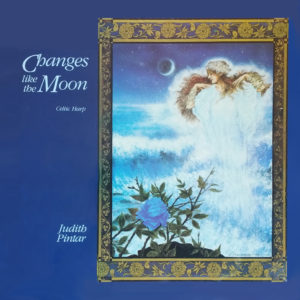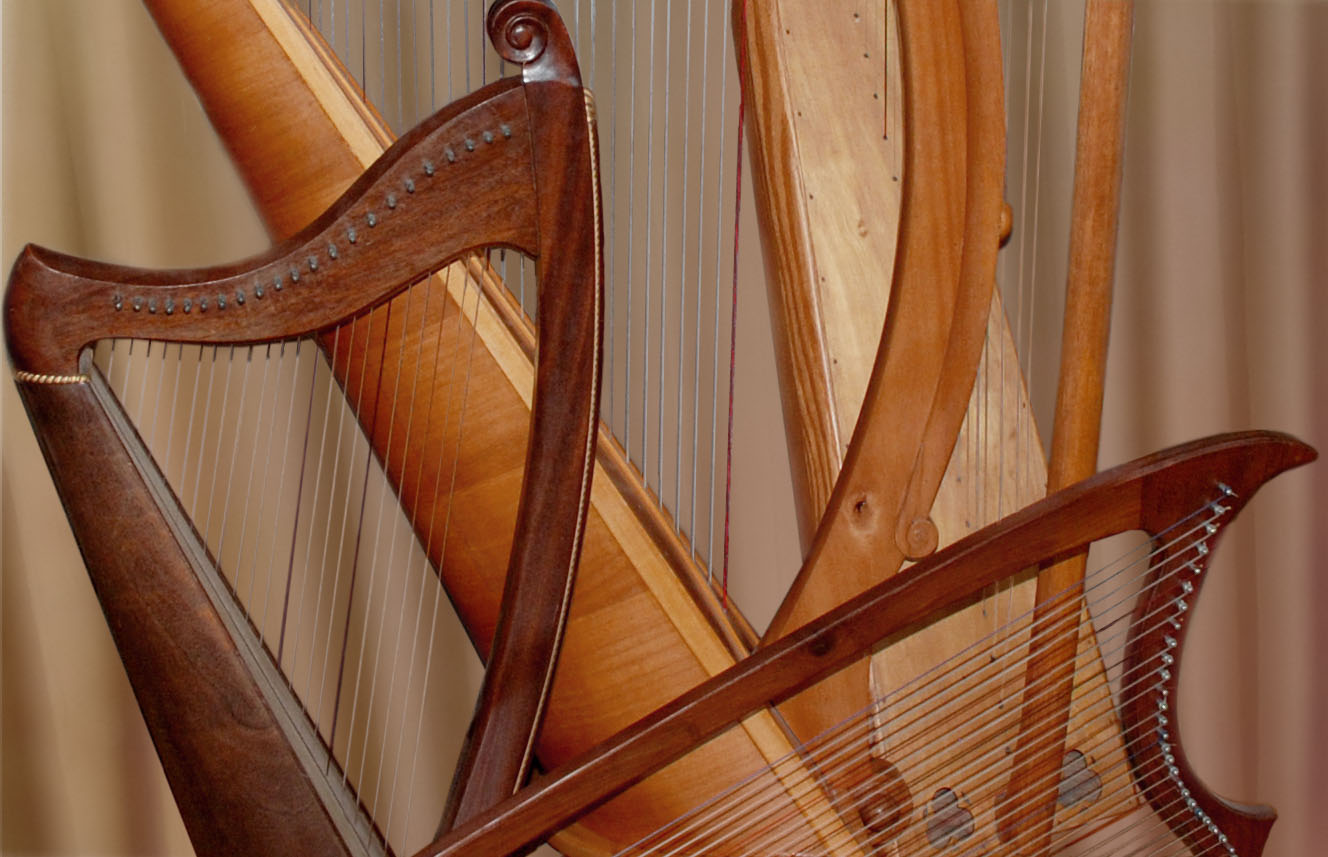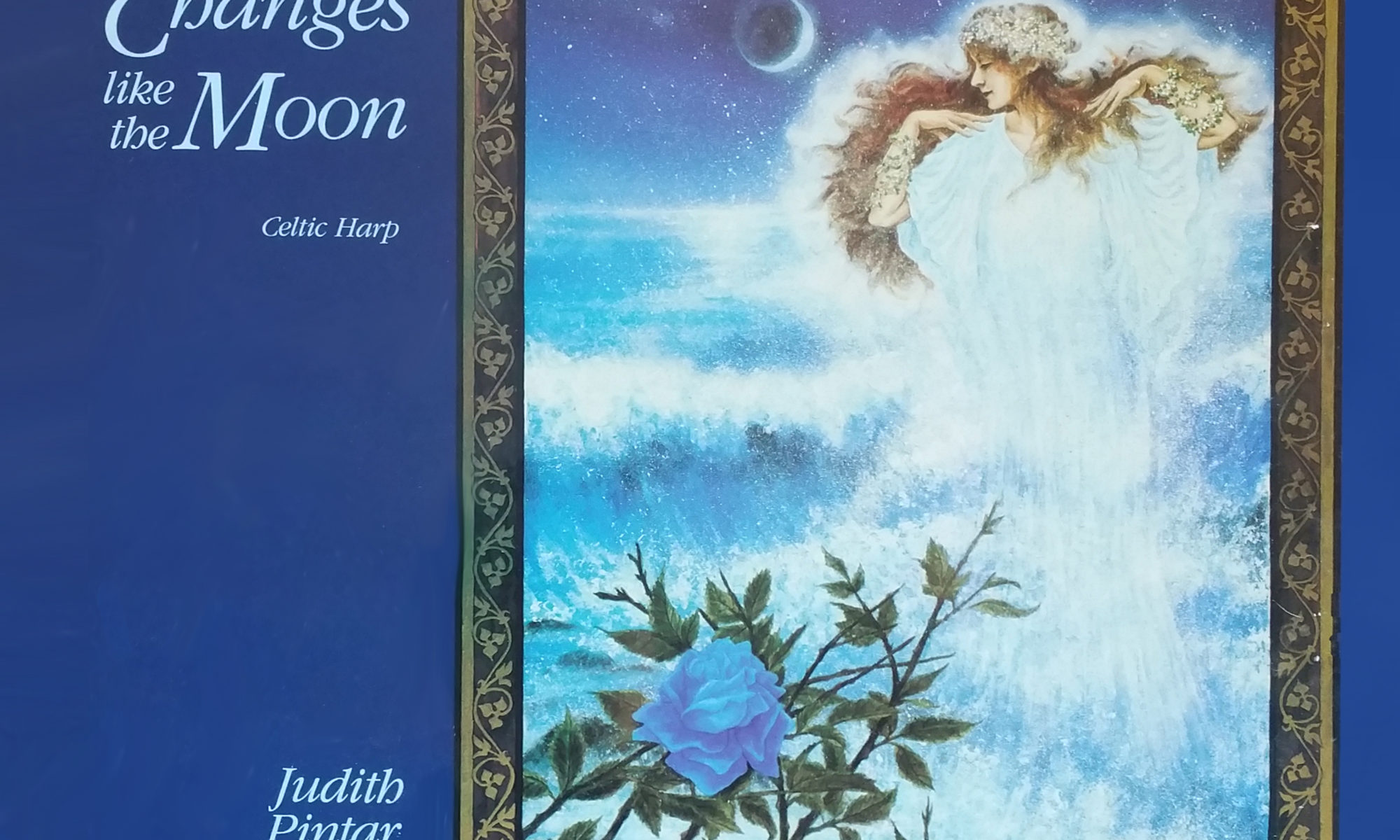 The compositions on Changes Like the Moon, my second release on the Sona Gaia/Narada label, were first developed as improvisations accompaning storytelling performances at folk festivals and renaissance fairs across the country. Although the recording was made using my Robinson’s Tara Harp, the music was composed on a Gothic harp made by Wisconsin harpmaker Glenn Walker Johnson.
The compositions on Changes Like the Moon, my second release on the Sona Gaia/Narada label, were first developed as improvisations accompaning storytelling performances at folk festivals and renaissance fairs across the country. Although the recording was made using my Robinson’s Tara Harp, the music was composed on a Gothic harp made by Wisconsin harpmaker Glenn Walker Johnson.
The original liner notes for the LP of Changes Like the Moon included a redaction of the Beauty and the Beast tale, and on the back of the album cover were two folk tales, Japanese and Scottish. None of these made it into the later cassette and CD releases.
The Beauty and the Beast story was deconstructed in my book The Halved Soul: Retelling the Myths of Romantic Love.
Beauty
Old Man
There once was a forest that suffered few men to live within its shadows. An old man lived in the center of this great forest with his three sons. His wife had long since died and the man feared to lose his children to their restlessness and longings. With wives, he thought, they might find their hearts filled and choose to root there in the shadows of his forest home.
“I’m going to the city to bring you home your heart’s desire,” he said to his sons each one by one.
His eldest son, a serious, hard-working man, asked for a wife who could stand strong and work hard beside him.
He second son, a lazy, laughing boy, asked for a girl who could laugh even louder than he.
But his youngest son, who was troubled with a poet’s heart, said, “If you would bring my true love to me, bring me a woman who is fine and fair and fey as a blue rose.”
“A blue rose has never grown upon this earth,” the old man protested.
“Nevertheless,” said the poet, “that is my desire.”In the city the old man found two sisters, poor but proud, who agreed to wed his eldest sons, one with a serious heart, the other with laughter as ready as spring.
Nowhere did he see a woman as fine and fair and fey as a blue rose. Sadly, but hardly surprised, the old man headed home.
When the forest is kind, it leaves the ground clear in places which men call paths.
But this day the forest moved the shadows and turned the paths, and sudden clearing opened before the old man. As he entered the clearing he saw a thorny branch and upon the branch, a single, perfect blue rose.
Blue Rose
Now the old man knew that this was an enchantment, but love for his son was stronger than caution. He plucked the rose from its branch. As soon as the rose snapped into his hand, a voice spoke from among the trees. “Thief,” said a woman’s voice, low and powerful. “You have stolen my rose.”
The old man answered most humbly. “Forgive me, but I wished only to bring a gift home for my son to ease his heart’s desire.”
An animal sound rose up from the forest. The old man thought it might be laughter and his heart chilled.
“An expensive gift. The price I ask is this same son. You may bring him the rose; he will return it here to me.”
The voice would not speak again despite all tears and protestations. The old man had no choice but to depart. Easily now, he found familiar which led him home.
Four pairs of eyes embraced in that forest heart in a love so natural it needed no instruction – which is how the serious hard-working son found a laughing girl in his arms, and a laughing boy found a woman serious enough to keep his feet on the ground.
That night, while two brothers slept in sweet contentment, the poet gazed at the strange enchantment of the blue rose which he held gently as a lover between his two hands. He left his father’s house in the first hush of morning. The paths that led to the clearing opened before him, and when he reached the wall, he found the gate open, waiting for him.
The poet entered a garden of wondrous beauty.
In the Garden
How long he walked there, he could not say. From the moment that he first entered, time lost some meaning that it once had. He found a table laden with fruit and strong wine that smelled of flowers. He ate there. Perhaps he slept. But if he dreamed, he dreamed only of the garden.
After a time he remembered that he had a voice and spoke words of praise for the beauty of that place. It was the speaking that caused other memories slowly, heavily, to rise.
“Where are you?” he beseeched. “You for whom all this beauty has been made? I smell your perfume. I taste your fruit. May I not see you?”
Then She was there. He had half feared to see some terrible thing hidden among all that beauty but terrible she was not, only strange. Her skin was fair, her features fine and her bearing fey as any blue rose.
Her voice was low and strong. “I appear before you because you have asked, as I am ever bound to do.”
It hardly needs to be said that the poet’s heart was lost all in one moment to the woman who stood before him. From that time on they were together in the garden sharing sweet fruits and heavy wine. Though she never told him that she loved him, he knew she must, for every evening she put one question to him in a voice which seemed to hide some longing or deep despair.
“And would you leave me?”
Thinking to reassure the pain he didn’t understand, each night he’d reply, “No, my Beauty, no, I will never leave you.”
Beauty would smile then (she never wept), and the poet fancied that she was comforted.
Beast
Time passed in its own fashion in the garden, but in the world beyond it moved in its normal course, and so it was that one day there was a knock upon the garden gate.
The poet found his elder brother there, breathless with his news, not one child, but two children just born, to himself, a daughter and to their brother, a son.
Could the poet come to share their joy?
Dreams vanished like mist before the sunlight and memories flooded back of the family he had given no thought to in the year that had past. Assuring his brother that if he could come he surely would, the poet stepped back into the garden and into dream.
Beauty’s reply to his request was simple and as familiar to him as the twilight.
“And would you leave me?”
The poet answered her that in seven days time he would return.
The house of the old man was filled with light as the poet approached, a stranger.
But so many arms drew him to the hearth and into their own warm embrace that he almost felt that he had never left at all. The days passed quickly, so full of food and laughter that few questions were asked about his life in the dreaming garden.
Not until he was packing to leave did one of his brothers find the poet alone so he could speak to him as man to man. He asked, with a low secret laugh, about the woman to whom his younger brother was in such a hurry to return.
The poet was offended by his brother’s tone, “I never have touched her.”
“Is she hideous then, as we have feared, some terrible beast?” asked the brother, his voice filled with fear, and love.
“She is the rarest beauty the Earth has known.”
“Well then, is she so large and strong that you fear to approach her, or is she well protected?”
“No,” said the poet. “She is slight and all alone there in the garden.”
“Then do you not desire her?” the brother asked, in some confusion.
In truth, during the long dream he had shared with Beauty, the poet’s love for the woman had so consumed him that he had not thought once to act upon it. But in the daylight with his brother’s questions and mocking laughter in his ears, he thought of Beauty and he smiled in a way his brother could understand, then he was clapped on the back and sent on his way.
Beauty
“Beauty,” the poet called as he entered the garden, and She was there. Her strangeness made her so desirable, he wondered if he had ever really looked at her before.
“Come here,” the poet said, surprised at the tone of his own voice, sure that she would turn and leave, more amazed that she approached. Then she yielded to him, yielded to his arms that roughly pulled her to him. He closed his eyes and kissed her.
Startled at the coldness of her lips, the poet opened his eyes again. He saw no woman’s face filled with love, but an animal, trapped beyond hope of freedom.
He remembered the first words she had spoken to him. “I appear before you because you have asked, as I am bound to do.”
He pushed her away, horrified at how he could have understood so little. “I will leave you, Beauty,” he said. “I will leave you now.”
The poet was moving away from the woman when he heard an animal noise behind him. Startled, he turned to see a wolf crouched there, eyes fierce and wild, poised to spring. As in a dream he accepted what he saw without understanding.
“I am to die then,” he thought.
The wolf sprang at him, mouth gaping, but he did not die. Instead he felt the breath of the wolf on his face. A quick succession of images appeared in his mind and he understood: cruel enchantment had changed wolf into woman, to dwell among men until some man might desire her but let her go.
One great leap more and Beauty was over the wall.
Joy and Sorrow
Slowly then, as the shadows of evening faded into night, the garden around the poet faded, just faded from his sight until he was alone in the somber forest. No garden, no wall, no table-laden, and most of all, no Beauty. Time passed, real time, minutes and hours before the poet could bring himself to move.
As he left the clearing where the garden was no longer he saw a small rose bush tangled in the messy undergrowth. A single rose grew there, a rose blue as the twilight sky, a rose as fair and fine and fey as a woman he once had loved.
With a sad smile he reached to take it, a token to carry with him to remind him of his Beauty But he stopped himself and left it there to grow. Humming a tune that sprang from his sorrowing (how then did it sound like joy?) he stepped back into the forest, not towards his father’s house, but into the wideness of the world.
Changes Like the Moon
The Robe of Feathers (a traditional Japanese Tale)
A long time ago a fisherman who cast his nets into a placid lake saw a crane dance upon the farther shore.
Drawing his boat near he realized that the crane was no living bird, but a robe, a robe of feathers hanging upon a branch and dancing to the wind’s song. He stepped upon the shore and took the robe from the branch. it was the most beautiful cloth he had ever seen. A woman rose from the water and beseeched the man to return her robe of feathers. When he would not, she began to weep.
“Without my robe of feathers I cannot return to the heavens.”
Then the man replied. “If you will live with me as my wife, I will return your robe to you.”
So the woman entered the boat of the fisherman. She went to his house and became his wife. But he hid the robe of feathers from her so that she could never leave him.
Seven years passed. She bore him two daughters and a son.
Then one day she found her robe of feathers hidden beneath the millet.
Donning the robe she became a white-plumed crane.
She flew into the heavens, dancing.
The Silkie (a traditional Scottish tale)
A long time ago a fisherman who cast his nets by the sea one night chanced to see a Silkie lay her skin down upon the rocks.
Now a Silkie is a seal by day but by night appears as beautiful a human creature as ever has walked the Earth.
The fisherman gazed upon the Silkie woman and thought he had never seen anything more fair.
When she was out of sight, he took the seal skin from between the rocks and hid it in his own house. Returning to the shore he found the Silkie weeping her salt tears into the sea.
“Lass, why are you crying like your heart is going to break?”
“Och, my heart is breaking indeed, for without my skin I cannot return to the sea and I do not know how to live upon the land.”
“You must come with me,” he said, “and be my wife.”
So she went with him and married him and raised him fine children.
Then one day she found her skin hidden behind a wall in her house. Taking the skin to the sea she became a seal once again, returning to the home that had never ceased its calling.

